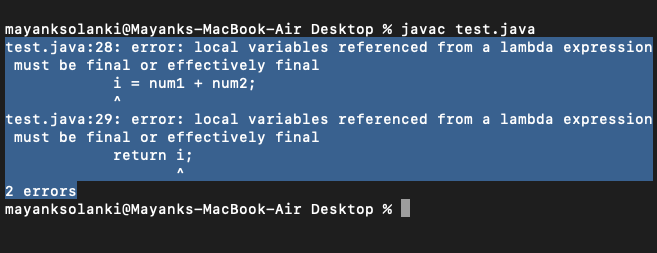Effectively Final Variable in Java with Examples
Last Updated :
04 Jan, 2023
A final variable is a variable that is declared with a keyword known as ‘final‘.
Example:
final int number;
number = 77;
The Effectively Final variable is a local variable that follows the following properties are listed below as follows:
- Not defined as final
- Assigned to ONLY once.
Any local variable or parameter that’s assigned a worth just one occasion right now(or updated only once). It may not remain effectively final throughout the program. so this suggests that effectively final variable might lose its effectively final property after immediately the time it gets assigned/updated a minimum of another assignment. Additionally, an effectively final variable may be a variable whose value isn’t changed, but it isn’t declared with the ultimate keyword.
int number;
number = 7;
Note: Final and Effective Final are similar but just that effective Final variables are not declared with Keyword final.
Example:
Java
import java.io.*;
class GFG {
public static void main(String[] args)
{
calculateValue(124, 53);
}
public static void calculateValue(int operand1,
int operand2)
{
int rem = 0;
rem = operand1 % 5;
class operators {
void setNum()
{
operand1 = operand2 % 2;
}
int add()
{
return rem + operand2;
}
int multiply()
{
return rem * operand1;
}
}
}
}
|
Output: An error will be thrown as expected which can be perceived from the terminal output as shown below:

Lambda expression capture values
When a lambda expression uses an assigned local variable from its enclosing space there’s a crucial restriction. A lambda expression may only use a local variable whose value doesn’t change. That restriction is referred to as “variable capture” which is described as; lambda expression capture values, not variables.
The local variables that a lambda expression may use are referred to as “effectively final”.
An effectively final variable is one whose value doesn’t change after it’s first assigned. There is no need to explicitly declare such a variable as final, although doing so would not be an error.
Implementation: Consider we do have an area variable let it be ‘i’ which is initialized with the worth say be ‘7’, with within the lambda expression we try to vary that value by assigning a new value to i. This will end in compiler error – “Local variable i defined in an enclosing scope must be final or effectively final”.
Java
import java.io.*;
@FunctionalInterface
interface IFuncInt {
int func(int num1, int num2);
public String toString();
}
public class GFG {
public static void main(String[] args)
{
int i = 7;
IFuncInt funcInt = (num1, num2) ->
{
i = num1 + num2;
return i;
};
}
}
|
Output:

Share your thoughts in the comments
Please Login to comment...